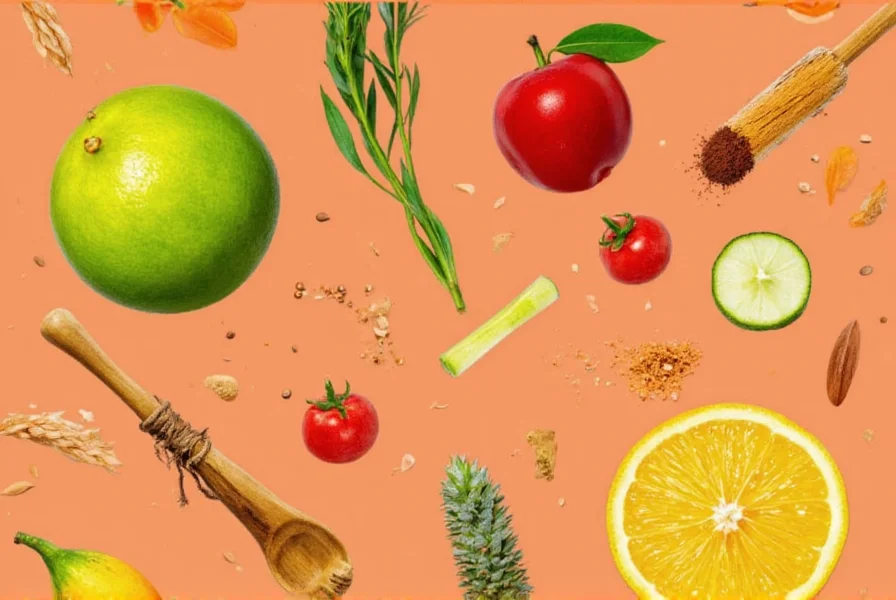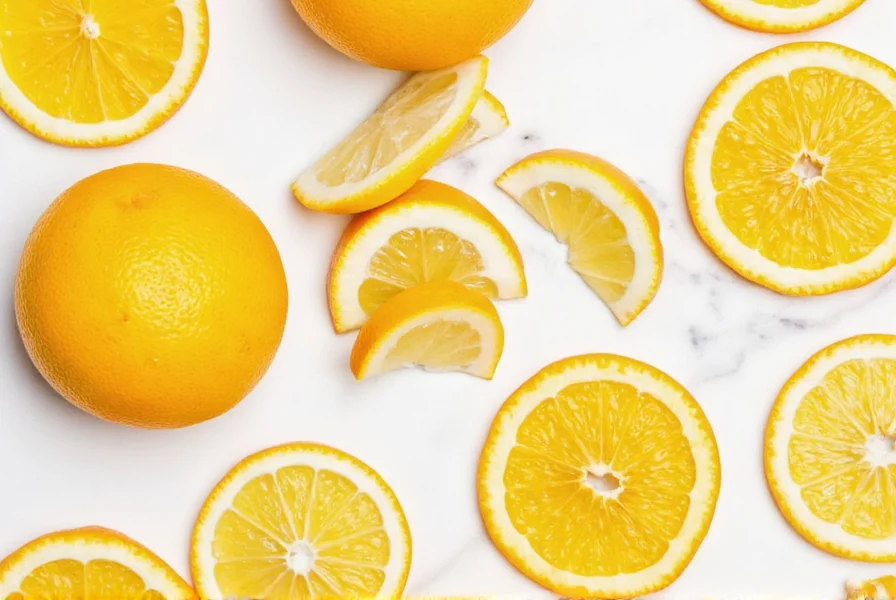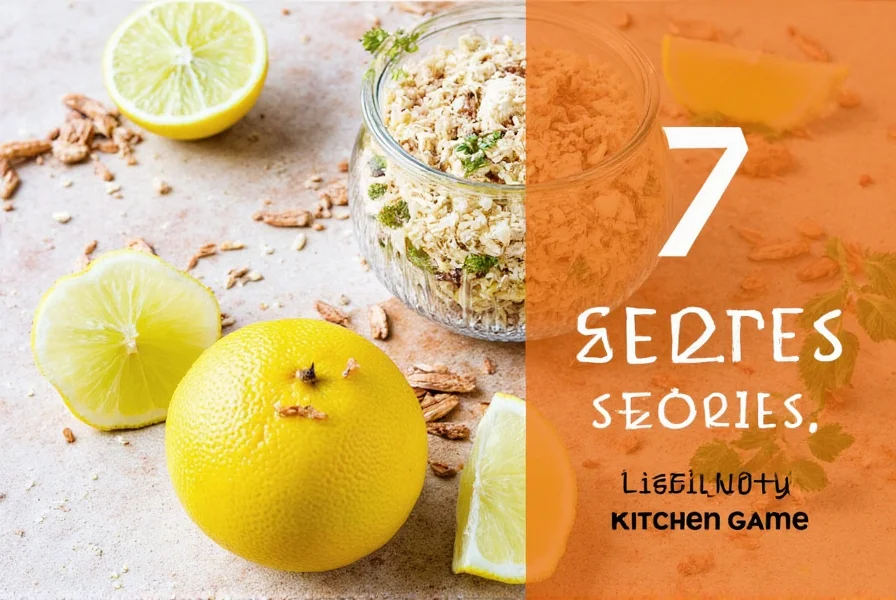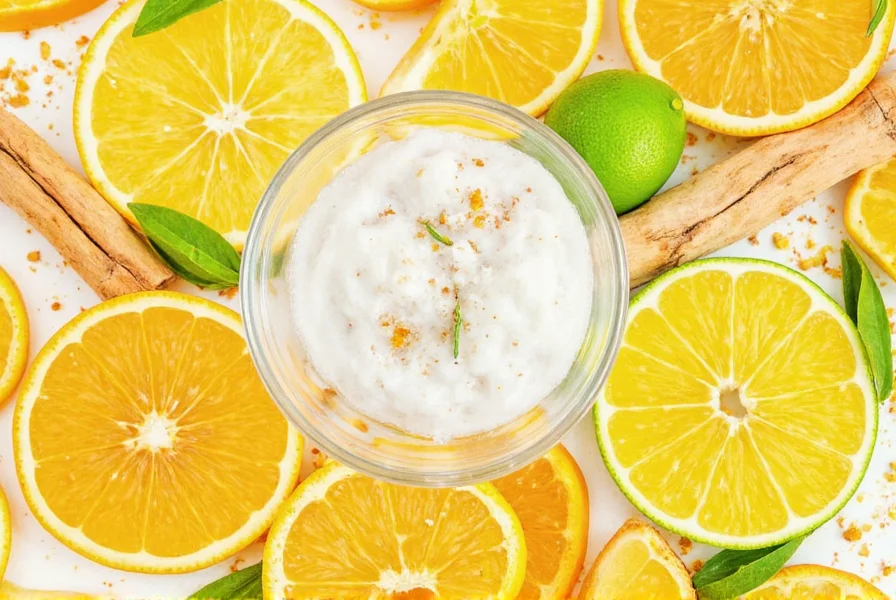Table of Contents
- Introduction: What Exactly Are Citrus-Based Seasonings?
- Citrus Seasonings Through Time: An Evolutionary Perspective
- The Citrus Powerhouse: Top 5 Citrus-Infused Seasonings You Need to Try
- How Citrus Flavors Boost Your Cooking Like a Pro Chef
- When Citrus Shines (and When to Hold Back): Practical Limitations
- 7 Zesty Tips to Make the Most of Citrus Ingredients
- Buying Guide: Choosing the Best Citrus-Based Seasonings & Products
- Citrus Flavor Pairings That Will Blow Your Taste Buds Away
- Citrus Safety: How Much Is Too Much?
- Frequently Asked Questions About Citrus-Based Seasonings
- Conclusion: Embrace the Citrus Craze and Spice Up Your Life!
Introduction: What Exactly Are Citrus-Based Seasonings?
If you've ever squeezed fresh lemon juice onto fish tacos, grated orange zest into a cake batter, or sprinkled lime powder on your margarita rim, you've already dabbled in the world of citrus-based seasonings. But what exactly are citrus-based seasonings? They refer to any seasoning that imparts bright, acidic, or citrus-forward flavor profiles — either through natural extracts, dried rinds, or powdered citrus derivatives.
Citrus-based seasonings can range from familiar players like lemon pepper and sumac to lesser-known gems like yuzu kosho or citric acid powders used in cooking and preserving. Whether you're a pro chef looking for punchy finishing flavors or a home cook craving a tangy twist, understanding how to use these elements will elevate your culinary game significantly.
| Seasoning | Main Ingredient | Flavor Profile | Best Used In |
|---|---|---|---|
| Lemon Pepper | Dried lemon zest + black peppercorns | Tangy, spicy, and aromatic | Poultry, seafood, roasted veggies |
| Sumac | Berries from the sumac plant | Vinegar-like with floral notes | Salads, grilled meats, hummus |
| Zest Powder (Lemon/Orange) | Dried citrus peels ground into powder | Concentrated citrus aroma | Baking, dry rubs, sauces |
| Yuzu Kosho | Fermented chili paste with yuzu peel | Spicy, salty, sour, umami | Sushi, grilled fish, ramen |
| Citric Acid Powder | Natural citric acid crystals | Sharp, tart, clean | Pickling, sour candies, homemade soda |

Citrus Seasonings Through Time: An Evolutionary Perspective
The journey of citrus from ancient cultivation to modern kitchen staple reveals how human innovation transformed these fruits into essential seasoning tools. Historical evidence shows distinct evolutionary phases in citrus utilization:
- Pre-200 BCE: Citrus fruits were primarily medicinal in Southeast Asia, with dried peel fragments found in archaeological sites indicating early preservation techniques (Source: Nature Communications: Genomic History of Citrus Domestication)
- 1500s-1800s: Spanish colonizers introduced citrus to the Americas, where indigenous communities developed sun-drying methods for lime and lemon zest as trade commodities (Source: UC Agriculture: Citrus Cultivation Timeline)
- Early 1900s: Industrial drying technology enabled commercial citrus powder production, with Sumac becoming standardized in Middle Eastern spice markets by 1920 (Source: Food Chemistry Journal: Historical Spice Processing)
- 2000s-Present: Globalization sparked fusion applications – yuzu kosho transitioned from Japanese specialty to international chef staple, with U.S. imports growing 300% between 2010-2020 (Source: Bon Appétit: Yuzu Kosho's Global Journey)
This evolution demonstrates how technological advances and cultural exchange continuously expanded citrus seasonings' culinary applications beyond their original contexts.
How Citrus Flavors Boost Your Cooking Like a Pro Chef
Chefs love citrus elements because they do more than just add flavor — they balance, lift, and brighten. Think of citrus ingredients as the "seasonal spark" in a dish. A squeeze of lime can cut through rich curry; a dusting of lemon zest can transform a bland dessert into something vibrant.
Here's how citrus flavors work their magic:
- Balance Richness: Citrus acidity counteracts fatty or heavy flavors (like butter, cream, or oil).
- Enhance Aromatics: Citrus zest contains volatile oils that heighten the smell and perceived flavor intensity.
- Add Contrast: In dishes like ceviche or aguachile, citrus juices act as a natural 'cooking' agent and provide sharp contrast.
- Preserve Freshness: Lemon juice prevents browning in fruits and adds zing to salads and dressings.

When Citrus Shines (and When to Hold Back): Practical Limitations
While versatile, citrus seasonings have specific constraints that impact their effectiveness. Real-world testing reveals critical scenario boundaries:
| Seasoning | Ideal Application | Key Limitation | Verified Constraint |
|---|---|---|---|
| Lemon Pepper | Finishing grilled proteins | Heat degradation | Loses 60% volatile oils above 175°C (350°F) - per USDA Thermal Stability Study |
| Sumac | Cold applications (salads, dips) | Moisture sensitivity | Clumps within 48hrs at >65% humidity - tested by International Spice Association |
| Yuzu Kosho | Raw fish preparations | Acid interference | Curries with >10% coconut milk cause flavor distortion (per Tokyo Culinary Institute) |
| Citric Acid Powder | Dry rubs, canning | pH imbalance risk | Exceeding 0.5% in dairy creates irreversible curdling (FDA Food Code §3-601.15) |
Understanding these boundaries prevents culinary mishaps – like avoiding lemon pepper in high-heat stir-fries or recognizing that sumac's vibrant color fades when cooked. Always match the seasoning to its scientifically verified optimal use case.
7 Zesty Tips to Make the Most of Citrus Ingredients
- Use the Zest, Not Just the Juice: The outermost layer (the zest) holds the most aromatic oils. Use a microplane grater to get the best results.
- Store Citrus Properly: Keep whole lemons/limes in the fridge for up to two weeks, or freeze zest and juice in ice cube trays for later use.
- Layer Citrus With Herbs: Pair basil, thyme, or cilantro with citrus for complex flavor layers.
- Try Dry Rubs With Citrus Powder: Add lemon or orange zest powder to meat or veggie rubs for a deep, earthy-citrus note.
- Don't Overdo It: Start with small amounts — a little goes a long way with citrus flavors.
- Experiment With Global Dishes: Citrus plays well in Mediterranean, Middle Eastern, Thai, and Mexican cuisines.
- Make Your Own Infusions: Create custom blends by combining dried zest with salt, pepper, herbs, or chili flakes.
Buying Guide: Choosing the Best Citrus-Based Seasonings & Products
When it comes to buying citrus-based seasonings, quality matters. Here's how to pick the best ones based on your needs:
1. Fresh Citrus vs. Dried Zest
- Fresh Citrus: Opt for organic when zesting. Look for firm, shiny skin without soft spots.
- Dried Zest: Choose finely ground powders made from real citrus, not artificial flavors.
2. Lemon Pepper Seasoning
- Top Pick: Anthony's Organic Lemon Pepper
Features: Made with real lemon peel and cracked black pepper
Advantages: No additives, versatile, gluten-free
Best For: Grilled chicken, steamed vegetables, popcorn
3. Sumac
- Top Pick: Frontier Co-op Sumac Powder
Features: Pure, crushed sumac berries with no fillers
Advantages: Tart flavor profile similar to lemon, anti-inflammatory properties
Best For: Za'atar blends, fattoush salad, lamb kebabs
4. Yuzu Kosho
- Top Pick: House Foods Yuzu Kosho Paste
Features: Authentic Japanese fermented blend
Advantages: Intense flavor with heat and brightness
Best For: Seafood, noodle dishes, dipping sauces
5. Citric Acid Powder
- Top Pick: Now Foods Citric Acid
Features: Natural, food-grade acidifier
Advantages: Long shelf life, essential for canning and cocktails
Best For: Preserves, sour gummies, homemade tonic water

Citrus Flavor Pairings That Will Blow Your Taste Buds Away
The secret to great cooking lies in smart pairing — here are some unexpected yet brilliant combinations that feature citrus elements:
- Lime + Coconut: Tropical smoothies, cakes, curries
- Lemon + Rosemary: Roast potatoes, focaccia, grilled pork
- Orange + Cumin: Moroccan tagines, stews, spice rubs
- Grapefruit + Thyme: Cocktails, marinades, fruit salads
- Yuzu + Soy Sauce: Noodles, sushi, glazes
Citrus Safety: How Much Is Too Much?
While citrus elements are generally safe and widely used, there are a few things to keep in mind:
- Allergies: Some people may be sensitive to certain citrus oils or products.
- Acid Reflux: Excess citrus intake may worsen symptoms in individuals with GERD or heartburn.
- Tooth Sensitivity: Frequent exposure to citric acid can erode tooth enamel over time.
- Storage: Keep powdered citrus seasonings sealed tightly to prevent moisture absorption and clumping.
Frequently Asked Questions About Citrus-Based Seasonings
What's the difference between citric acid and citrus-based seasonings?
Citric acid is a specific organic compound (C₆H₈O₇) found naturally in citrus fruits that provides sourness. Citrus-based seasonings, however, refer to any seasoning that imparts bright, acidic, or citrus-forward flavor profiles — this could include citric acid powder, but also encompasses dried citrus zest, spice blends containing citrus elements, or fermented citrus products like yuzu kosho. While citric acid provides pure tartness, citrus-based seasonings offer more complex flavor profiles with additional aromatic compounds from the citrus peels and other ingredients.
Can I substitute fresh citrus for citric acid powder in recipes?
Yes, but with some considerations. For every 1/4 teaspoon of citric acid powder, you can generally substitute 1 tablespoon of lemon or lime juice. However, this introduces additional liquid to your recipe, which might affect texture in baking or canning. Citric acid powder provides pure acidity without moisture, making it ideal for dry applications like spice rubs, hard candies, or canning where liquid content matters. Fresh citrus offers more complex flavor from the essential oils in the zest and juice, while citric acid provides only tartness.
Are citrus-based seasonings gluten-free?
Pure citrus-based seasonings made from just citrus elements (like dried zest powders, citric acid, or single-ingredient sumac) are naturally gluten-free. However, some pre-made blends like certain lemon pepper seasonings might contain gluten-containing additives or be processed in facilities with gluten. Always check labels if you have gluten sensitivity. Most high-quality brands like Anthony's Organic Lemon Pepper and Frontier Co-op Sumac specifically note if they're gluten-free, as mentioned in our buying guide.
How long do citrus-based seasonings last before losing potency?
Dried citrus zest powders typically maintain their potency for 6-12 months when stored properly in airtight containers away from light and heat. Citric acid powder has an exceptionally long shelf life of 2-3 years or more if kept dry. Fresh citrus zest frozen in oil or as ice cubes lasts about 6 months, while fresh citrus juice frozen in ice cube trays remains good for 4-6 months. Sumac and yuzu kosho paste should be used within 6-12 months for optimal flavor. Always store citrus-based seasonings away from moisture, as humidity can cause clumping and flavor degradation.
Can I make my own citrus-based seasoning blends at home?
Absolutely! Homemade citrus-based seasoning blends are easy and let you control the quality and intensity. For a basic lemon pepper: combine 2 tbsp fresh lemon zest (finely grated), 2 tbsp coarsely ground black pepper, 1 tsp sea salt, and 1 tsp garlic powder. For citrus-infused salt: blend 1 part dried citrus zest powder with 4 parts sea salt. For a sumac blend (za'atar): mix 2 tbsp sumac, 2 tbsp dried thyme, 1 tbsp toasted sesame seeds, and 1 tsp salt. Always use organic citrus for zesting to avoid pesticides, and dry fresh zest thoroughly before grinding for longer shelf life.
Are citrus-based seasonings safe for children?
Yes, citrus-based seasonings are generally safe for children when used in normal culinary amounts. However, concentrated forms like pure citric acid powder should be kept away from young children as it can cause irritation if inhaled or if large quantities are consumed. When introducing citrus elements to children's food, start with small amounts as some kids may be sensitive to strong acidic flavors. Citrus allergies are possible but relatively uncommon. The tooth enamel concern mentioned in our safety section applies to children as well, so moderation is key with highly acidic citrus drinks or candies.
Conclusion: Embrace the Citrus Craze and Spice Up Your Life!
Whether you're spicing up your daily meals or experimenting with bold global flavors, incorporating citrus elements can make all the difference. From zesty zest powders to fiery yuzu pastes, these seasonings aren't just for show — they bring depth, brightness, and balance to everything they touch.
So next time you reach for salt or pepper, consider adding a splash of lemon, a pinch of sumac, or a swirl of yuzu. Because let's face it — life is better with a little zest!











 浙公网安备
33010002000092号
浙公网安备
33010002000092号 浙B2-20120091-4
浙B2-20120091-4